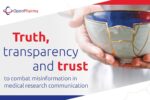This week, we read about the OpenAIRE Graph and the steps we can take to make research and healthcare information more accessible to all. We highlight proposed solutions to improve the peer review process and recent research on how ‘coercive citations’ can influence the peer review process. We discuss whether research publications can be tailored for AI and how AI-generated research may pose plagiarism risks. Finally, we highlight key insights from the COPE AI Forum and signpost the open portals for proposal and abstract submissions for ISMPP Europe 2026.
To read:
Reforming research assessment with open science knowledge graphs via LSE Blogs | 6-minute read
Knowledge graphs like the Open Access Infrastructure for Research in Europe (OpenAIRE) Graph are evolving with Open Science principles to incorporate a wide range of publishing outputs, such as data and software. But “[can we assume] that building open science knowledge graphs […] will automatically provide the research assessment indicators we require?”, asks Paolo Manghi (Chief Technology Officer at OpenAIRE Graph). In this article, Manghi draws on his experience with, and user feedback of, the OpenAIRE Graph to highlight learnings that can be used to drive research assessment reform.
How can we ensure academic publishing is accessible to all? via The Scholarly Kitchen | 5-minute read or 10-minute listen
Through the uptake of Open Access (OA) principles, research is more available than ever. Despite this, only 2.4% of academic PDF articles were fully compliant with accessibility criteria per research from the Allen Institute. This lack in accessibility is especially of concern when considering disabilities, such as dyslexia or vision impairments, and other intersectional barriers faced by people in developing countries. This article outlines the importance of fostering empathy, the technical barriers and solutions, and practical strategies to implement the European Accessibility Act.
Steps to improve accessibility of healthcare information via ISMPP | 11-minute read
“Accessibility is not a niche concern; it is a universal imperative that strengthens the foundation of effective, patient-centered healthcare”, state the authors of this article published by the International Society for Medical Publication Professionals (ISMPP). The authors share a summary of key global accessibility standards, such as the World Wide Web Consortium, and provide tangible tools and changes that pharmaceutical companies, communications agencies and journal publishers can implement to make their content more accessible and inclusive to all. The article also introduces an accessibility checklist for digital content and explores case studies emphasizing how small changes can enhance accessibility.
Alternate approaches to finding peer reviewers via The Publication Plan | 2-minute read
Over the last 20 years, there has been a more than 290% increase in the annual article publication volume, which has placed an increased pressure to recruit peer reviewers. However, Arunas Radzvilavicius (Editor at Springer Nature), argues that the number of available reviewers has also increased. Dr Radzvilavicius proposes four solutions to the perceived peer reviewer drought including the development of advanced, impartial tools to source peer reviewers, engaging more junior expert reviewers, using artificial intelligence (AI) to automate time-intensive tasks such as verifying statistics and offering financial compensation to incentivize peer review.
Do ‘coercive citations’ influence the peer review process? via Nature | 3-minute read
A recent preprint analysing 18 400 articles from four OA publications claims that peer reviewers are more likely to approve a manuscript if their own work is cited. In over 400 reviews in which the reviewer was not initially cited but requested a citation, 92% recommended approval when they were cited, compared with 76% who were not cited. “…the authors know that the reviewer is probably going to evaluate any revised versions of the article, so authors might opt for the path of least resistance and include the citation to get their paper accepted”, says Adrian Barnett (Professor and Statistician at the Queensland University of Technology).
Should scientific communications be tailored for AI? via The Scholarly Kitchen | 3-minute read
“If we want these [AI] tools to contribute meaningfully to scientific discovery, we need to rethink how research content is structured for their consumption and – necessarily – how it’s paid for”, argues Tim Vines (Founder and Chief Executive Officer of DataSeer). Generally, research articles are published as PDFs designed for human readers. But because AI now plays a more prominent role in the research cycle, we must reconsider the formats, payment models and quality control processes of scholarly publishing. Read the full article and learn how AI-ready research articles may herald a new business model for publishers.
AI-generated research poses plagiarism risk via Nature | 8-minute read
AI-generated research, such as that carried out by ‘The AI Scientist’, which generates its own ideas, runs code and writes its own research papers, marks a new frontier in scientific discovery. But how can we keep these AI scientists in check? This Nature article shares recent evidence of potential AI plagiarism, whereby methods or concepts are reused without attribution, and opens the discussion on what counts as plagiarism in the context of AI.
Ensuring AI works with us and not instead of us: conclusions from the COPE AI Forum via The Scholarly Kitchen | 8-minute read
At the Committee on Publication Ethics (COPE) July 2025 Forum, four key themes were explored in the emerging AI dilemmas in scholarly publishing topic discussion: responsible and ethical use of AI, transparency and disclosure, detection and editorial standards and the impact on peer review, equity and inclusion. Authors Hong Zhou (Senior Director of AI Products and Innovation at Wiley) and Marie Soulière (Head of Editorial Ethics and Quality Assurance at Frontiers and COPE Council Member) summarize the discussions and conclude with three key elements required to successfully adopt AI in scholarly publishing.
To engage with:
Submit your session proposal or research abstract to the 2026 European Meeting of ISMPP via ISMPP
The European Meeting of the ISMPP, taking place in London between 26 and 28 January 2026, is now accepting session proposals and research abstract submissions. The deadlines for submission are 3 October 2025 for session proposals and 17 October 2025 for research abstracts. Early bird registration pricing runs from 9 to 24 September 2025.
Enjoy our content? Read last week’s digest and check out our latest quarterly update!
Don’t forget to follow us on Bluesky and LinkedIn for regular updates!






